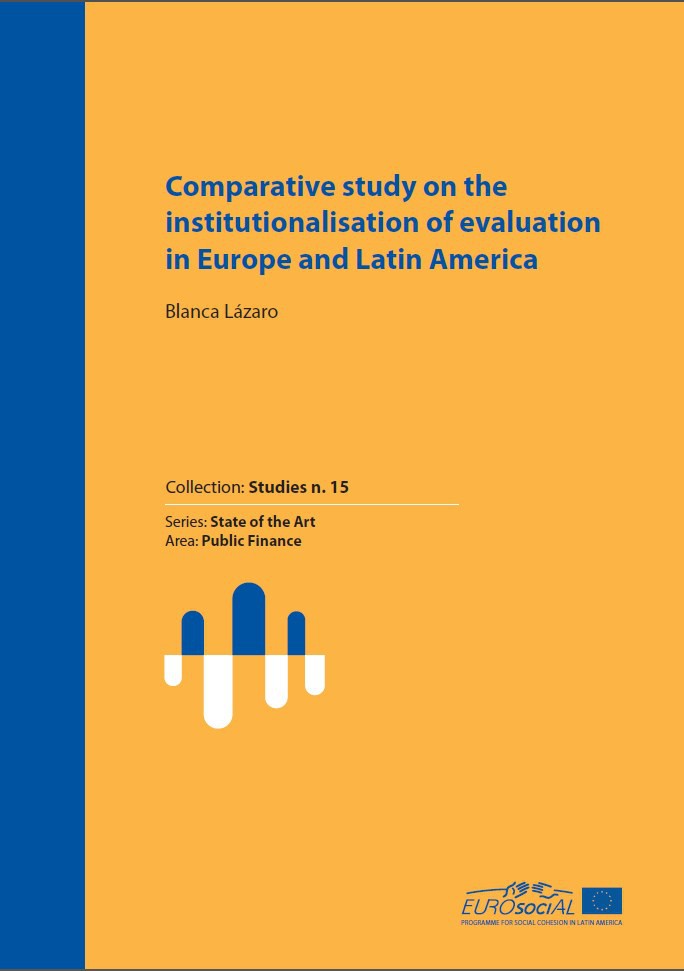Comparative study on the institutionalisation of evaluation in Europe and Latin America
Información sintética sobre el documento [ID: 6408]
| Título: |
Comparative study on the institutionalisation of evaluation in Europe and Latin America
|
| Autor/Editor: |
Lázaro, Blanca
|
| Fecha: |
01/03/2016
|
| Tipo: |
Publicaciones EUROsociAL
|
| Colección: |
Estudios
|
| Nº de colección: |
15
|
| Serie: |
Estados de la Cuestión
|
| Idioma: |
Inglés
|
| Áreas Temáticas: |
Finanzas Públicas
|
| Palabras Clave: |
evaluación cuantitativa; evaluación; evaluación de impacto; políticas públicas
|
| Descargar informe: | |
| Descripción: |
This report is intended to contribute to the description and analysis of the public policy
evaluation systems being developed in various European and Latin American countries, and to the identification of factors that determine the proper implementation of these systems. Beyond the significance of the description and analysis themselves, the ultimate objective is to offer an approach to possible alternatives for the institutionalisation of evaluation in four countries of Latin America: Costa Rica, Ecuador, Peru and Paraguay. The emergence, configuration and evolution of state-level evaluation systems has been the subject of analysis for a relatively short period of time, which undoubtedly represents a limitation for this study. This affects our understanding of what an evaluation system is; what its components are; what is its role and mission in a institutional public setting; its resources, activities, and the results to be expected from this system; the factors that determine whether it is functioning correctly or incorrectly, and whether its results are satisfactory or unsatisfactory. Conversely, it is also important to observe the social and cultural setting in which evaluation is carried out. Successful recipes for a specific context may not work in a different one since they will need to be implemented by other people who may be immersed in a different political, administrative and organisational culture; under social and economic conditions that may vary substantially; and as part of personal, professional and institutional networks that may also be different. This report has been prepared based on a review of academic literature and documents produced by international bodies and public sector agencies in the countries studied. It does not include field work, particularly interviews with leaders or other stakeholders of the studied evaluation systems, and it has therefore not been possible to confirm or update the documentary information in some cases. With regard to Spain, the documentary analysis is combined with the experience of the author in the management of a leading body for policy evaluation in that country between 2008 and 2013. Even with these limitations, the report provides the benefit of bringing together in a single document a panoramic view of both the evolution and current situation of evaluation systems in a good part of Europe and a selection of Latin American countries, as well of analysing the main issues, obstacles and lessons learned with respect to the creation and development of these systems. The text is structured in four sections. The first section reviews and sets out the current conceptual framework for evaluation systems and strategies for promoting them. The second section focusses on evaluation systems in European countries. The third section analyses the situation in certain Latin American countries. The final section sets out conclusions and recommendations intended to serve as a basis for devising, in the short term, specific roadmaps for the institutionalisation of evaluation in the aforementioned four countries. |

|
Documentos relacionados
|
Actividades vinculadas
Paises vinculados
| País: | Función: |
|---|---|
| Supranacional | - |
Aviso LegalPARTICIPAN MÁS DE 80 SOCIOS OPERATIVOS Y ENTIDADES COLABORADORAS DE EUROPA Y AMÉRICA LATINA
